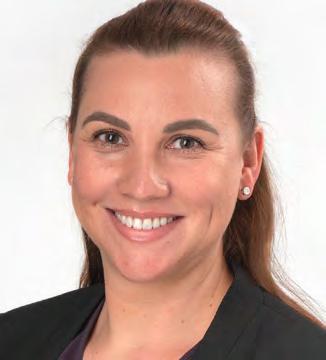
6 minute read
Trainee wellbeing under the spotlight
The wellbeing of Trainees is a significant area of focus for the Royal Australasian College of Surgeons (RACS). The RACS Wellbeing Working Group, tasked with reviewing existing support options for surgeons, has produced a report and a Wellbeing Action Plan to be considered by RACS Council in October. The Action Plan addresses gaps and new opportunities to advance wellbeing for Trainees, Specialist International Medical Graduates and Fellows.
The working group comprises RACS Fellows, a RACS Trainees’ Association committee member and representatives from several Australian and Aotearoa New Zealand specialist medical colleges, alongside external doctors’ wellbeing experts. While both the group’s report and Action Plan aims to support all doctors, the wellbeing of Trainees is a key concern that the working group, and RACS more widely, are working to address. RACS Wellbeing Working Group member, Associate Professor Philip Truskett said the review had identified a need for a broad and collaborative approach to supporting surgical Trainees. “A multi-pronged approach is needed, which will require more than just sitting people in a lecture theatre and telling them how they should behave,” he said. “The whole training process needs to become more interactive, with more frequent and compassionate communication and feedback to Trainees.”
Advertisement
The report recommends RACS involvement in a collaborative research project on doctors’ health and wellness to establish the current state of wellbeing for all specialist doctors. It also includes the establishment of an Intercollege Wellbeing Working Group to oversee implementation of the Wellbeing Action Plan. Associate Professor Truskett believes the actions will be particularly pertinent following disruptions to normal training and surgical schedules caused by the COVID-19 pandemic. “We understand Trainees might need more support than in the past, and that the goal posts have moved since COVID-19,” he said. “Everyone is really understanding of how concerned Trainees are and the College is working very hard to do its best to improve the wellbeing of these Trainees. “We need to ensure a nurturing—not a judgemental—environment for Trainees, and that involves more Traineementor interaction, the development of significant briefing and debriefing skills, and more guidance for Trainees during their training. “There needs to be an emphasis on emotional support, alongside the technical education received by Trainees.” Associate Professor Truskett attributes some of the wellbeing challenges faced by surgical Trainees, and the wider Fellowship, today and in the past, to a range of circumstances specific to surgery. “The profession is hands on, requires hard work, is stressful and often the stakes are high. Even though there is some teamwork, you can feel very alone at times, particularly when things aren’t going well. It’s a difficult profession,” he said. “Now, we are becoming more aware of the dangers of poor mental and physical health in our Trainees and colleagues. It’s something that we may have tended to ignore in the past.” The working group’s wellbeing review comes after the release of the Wellbeing Charter for Doctors (https://bit. ly/3cTX47w), which has been formally endorsed by a range of specialist medical colleges including the Royal College of Surgeons of Edinburgh. The charter is an initiative led by the RACS Wellbeing Working Group and includes the Australian and New Zealand College of Anaesthetists, the Royal Australian and New Zealand College of Obstetricians and Gynaecologists, and the Australasian College for Emergency Medicine. It describes the shared responsibility for doctors’ wellbeing and has been endorsed by 15 specialist medical colleges in Australia and Aotearoa New Zealand.
The charter, launched in August 2021, has been an exercise in collaboration across colleges to advocate for doctors’ wellbeing with a unified voice. Associate Professor Truskett says the charter outlines the roles and responsibilities surrounding wellbeing within the profession and the workplace. It is intended to be a springboard for conversations about wellbeing. “In the past it has been implicit, but now it is explicit.” A general surgeon at Prince of Wales Hospital in New South Wales and former

Associate Professor Philip Truskett
RACS President, Associate Professor Truskett was pleased to be part of the RACS Wellbeing Working Group after experiencing the importance of support and mentoring during his own traineeship. “The training was quite different then and was done within isolated hospital rotations.
“Trainees had very little understanding of the role of the College and considered its sole responsibility to be setting the Fellowship exam that we all had to pass. As Trainees, we identified with our institution and not the College. “I had a very positive experience as my mentors were very supportive of their colleagues and Trainees. They were nurturing role models and had a lot to do with my own professional identity. “I know that wasn’t the case everywhere.” He says improvements to wellbeing will have broad benefits for the surgical and wider community. “It will reflect in the quality of care of the patients and the quality of life and wellbeing of doctors.” Royal Australasian College of Surgeons Trainees’ Association (RACSTA) Chair Dr Sharon Jay agrees with Associate Professor Truskett about the importance of wellbeing and the impact of the pandemic on Trainees. Dr Jay believes that measures including improving access to leave, relocation costs and paid overtime would help improve the experience of Trainees. “We all know that training is hard, but there are things that we can do to make it better. And that’s what we’re trying to advocate for as a Trainee committee,” she said.

The Australian Medical Training Survey in 2021 revealed only 49 per cent of surgical Trainees reported having a good work-life balance, compared with 64 per cent in other specialty colleges. The report found that nearly half of surgical Trainees across all specialties had experienced discrimination, bullying or sexual harassment.
Dr Jay, a SET 5 General Surgery Registrar at Christchurch Hospital, says a significant change in surgical culture is needed. She added that improving Trainees’ wellbeing requires more than simply introducing wellbeing courses. “The bottom line is that if we really want to make meaningful culture change, you don’t put a band-aid on the problem. “We need systemic change to improve surgical culture that will ultimately improve the training experience for everyone.” Dr Jay rates the current wellbeing of Trainees at three out of five and said that while there is a long way to go, the culture within the profession has already improved in the past decade, particularly since the 2015 Expert Advisory Group Report on Discrimination, Bullying and Sexual Harassment.
“In the years since the Operating with Respect course was introduced, I’ve seen an improvement in surgical culture.
“Things are starting to change and there’s recognition within surgery that culture and wellbeing are really important.
“If you’re a healthy surgeon who’s happy and working in a positive, supportive environment, you’re going to be a better colleague and teacher. You’re also going to translate that to your care of patients and that can only improve patient care.” Dr Jay would like to see the culture continue to progress towards a more balanced model for Trainees. “I think what we should move to is more of a ‘work and live well’ idea; that is where we are able to both work and be well-supported to do so, but also take time to switch off and to pursue other aspects of our lives. “This is especially important in trying to prevent burnout among Trainees and junior doctors.” Looking back at her own training, Dr Jay believes she would have benefited considerably from this approach. “You shouldn’t have to choose between your career or your health and wellbeing. Sometimes I haven’t gotten those priorities right and I just don’t think it has to be like that. Surely, we can do better for the next generation of Trainees, and, by extension, for Fellows,” she said. “We’re now seeing flexible training being used by Trainees for parental leave or to pursue academic research interests and even higher degrees oversees, which is really exciting. I hope this will increase in the future.”
Dr Sharon Jay
Need to talk to someone?
The RACS Support Program delivered by Converge International offers four support sessions a year to you and your family. The sessions are free and confidential for any personal or professional concerns.











